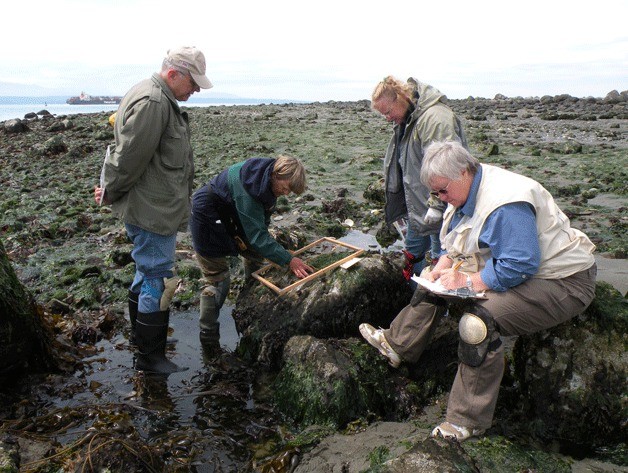The stewards of the Salish Sea wave their flags of welcome to fellow beach lovers.
The Island County Beach Watchers invite anyone who is interested in learning how to preserve and protect the beaches of the island to join the next training session.
Beach Watchers training dates are April 4-27 and Oct. 3-31, but the deadline for registration ends Wednesday, March 9.
Whether it is an interest in learning how to protect and preserve one’s favorite beach, or concern about development and its impact on the island’s natural resources, or to just better understand the geology and biology of the islands and share one’s love of nature, the Beach Watchers training sessions answer the call of all those who love the beach and want to learn more.
Beach Watchers are dedicated environmental educators with the goal of leading the community in the protection and preservation of the natural world through science and educational outreach.
The training program includes 100 hours of expert training by seashore professionals, including guided outdoor field trips to places such as Deception Pass and Cama Beach state parks, Padilla Bay National Estuarine Research Preserve, the Whidbey Watershed Stewards’ Outdoor Classroom and the Penn Cove shellfish facility.
The focus of the training program is on water quality, but it also explores watersheds and groundwater, marine biology and oceanography, salmon and nearshore habitats, climate change, noxious weeds, agriculture, forestry, waste reduction, recycling, sustainable living, native plants and wildlife, intertidal monitoring and coastal geology.
Although there is no tuition for the training program, there is a fee to offset printing costs. In return for the education, all new Beach Watchers must sign a contract that commits them to 50 hours of volunteer community outreach for two consecutive years.
There are many ways to fulfill the time commitment, and the hours add up quickly. Organizers of the program say it is easy and fun, and prospective watchers can tailor their service to fit their talents, interests and comfort level. Some volunteers participate in intertidal monitoring of beaches, while others speak at schools and community meetings, lead beach walks, give nature talks or troll the shorelines for trash and noxious weeds.
The training takes place from 8:30 a.m. to 4 p.m. on Mondays and Wednesdays, with most on-site classes taking place in Coupeville. Trainees attend both the April and October sessions.
The application process closes March 9. Go to www.beachwatchers.wsu.edu/island/ to download an application, or visit the Washington State University Extension office at 101 NE Sixth St. in Coupeville and pick one up. Call 360-679-7391 for more info.
After receipt of an application, Beach Watchers will contact potential trainees to arrange for a short interview. Don’t be intimidated by the interview; it is just a way to make sure everyone is aware of the type of commitment expected by volunteers who are accepted into the training class.
The program is flexible and will work with all potential Beach Watchers to find the best ways to apply their skills, interests and knowledge.



